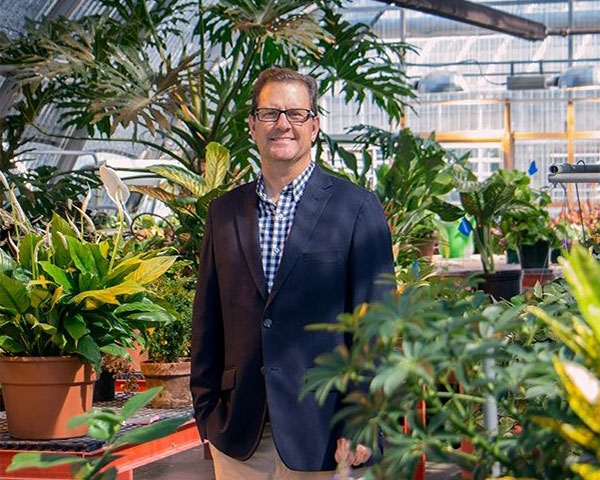July 1st marks the five-year anniversary of the School of Plant and Environmental Sciences. It was formed in 2018 by bringing together three departments: Crop and Soil Environmental Sciences, Horticulture, and Plant Pathology, Physiology, and Weed Science.
When we started the integration process, we knew there would be challenges bringing together three departments with a greater than 350-year collective history. But none of us imagined we would be dealing with a global pandemic. While COVID-19 did present challenges, it was not able to stop the growing momentum that has led to considerable progress on upgrading facilities, introducing new undergraduate majors, creating two research centers, and hiring new faculty to help lead us into the future.
Teaching
SPES added nine new tenure-track faculty positions at the Blacksburg campus and five at Agricultural Research and Extension Centers across the commonwealth. SPES also added an instructor and collegiate faculty member to focus on undergraduate education.
Since the formation of the school, we have awarded more than 75 Ph.D.’s, 50 master’s, and hundreds of bachelor’s degrees.
To make sure students have the proper facilities to learn, the school upgraded eight teaching spaces, including classrooms, laboratories, and learning sandboxes. SPES added 11 new courses to the curriculum over the last five years with the number of credit hours taught increasing by 25 percent. One of those courses — Cannabis – Science, Industry, and Culture — is a popular course for both majors and non-majors. This spring, nearly 1,000 students enrolled in the course.
Two new majors were added to the school’s curriculum. Ecological Restoration is the process of guiding the recovery of degraded or destroyed ecosystems. Students in the major engage in a structured program of learning that moves from introductory courses in the biological and physical sciences to courses in soil science, ecology, geology, plant science, and ecological restoration. The curriculum was designed in conjunction with the Society for Ecological Restoration’s Certified Ecological Restoration Practitioner In-Training Program.
The Integrated Agriculture Technologies major prepares students for work in the applied sciences using advanced technologies to improve plant productivity and environmental protection. Students learn to work with drones, robots, environmental sensors, and data analytics to improve the sustainability of field crops and horticultural systems.
Research
SPES continues to increase its research efforts in several areas including invasive species, plant genomics and crop breeding, and soil health and management. This variety in research area and expertise reflects the diverse nature of agriculture and environmental protection in the commonwealth.
During the school’s short history, our research faculty have produced nearly 1,000 publications with graduate students and post-doctoral advisees well represented as authors and contributors. More than 50 percent of the grants applied for were awarded. During the last half-decade, nearly 500 grants were received by the school, totaling nearly $37 million. Internal grant funding continues to grow as well from sources including the John Lee Pratt Foundation, the Powell River Project, the Institute for Critical Technology and Applied Sciences, and the Fralin Life Sciences Institute. Since 2018, SPES has been awarded $2.2 million from these sources.
To accommodate the research teams, seven research labs have been renovated and two new centers created. The first center is the Agricultural Technologies Innovation Center. The center was designed to bring together faculty working in the area of agricultural and environmental technologies. Having them in a single location increases interaction, promotes creativity, increases efficiencies, and promotes creative collisions, leading to technology advancements and new intellectual property.
The school has also partnered with the Institute for Advanced Learning and Research in Danville, Virginia and the Seafood Agricultural and Extension Center to create the Controlled Environmental Agriculture Innovation Center. The unique partnership better connects SPES to stakeholders, increases visibility for the school in the commonwealth, and elevates Virginia Tech as a major CEA center in the United States. The creation of the center allows SPES to become involved in economic development in Virginia, leading to the creation of hundreds of jobs as new businesses move into the commonwealth.
Extension
SPES has 40 faculty members with an Extension appointment. Areas of focus vary widely, leading to unique programmatic opportunities and collaborations within the school, college and Virginia Cooperative Extension. Focus areas include cover crops, home gardening, plant pathology, soil fertility, and turfgrass. SPES faculty have produced 260 documents for Virginia Cooperative Extension in the last five years. Even through the pandemic, total direct and indirect contacts with the public and stakeholders increased.
The Virginia Tech Turfgrass Team is a unique partnership among SPES and the Virginia Turfgrass Foundation. The team, with funds raised by the Virginia Turfgrass Association, has applied research facilities throughout the commonwealth to develop and test new grasses and a wide variety of innovative management strategies.
The Virginia Master Gardener Program provides communities with locally identified programs, including answers to individual questions via hotlines and plant clinics and educational programs to meet targeted needs. Nearly 90 percent of our Extension faculty contribute to the Master Gardener program each year.
The Virginia Agriculture Expo is the largest agricultural field day event in the commonwealth. It is a cooperative program among more than a dozen SPES faculty, Virginia Soybean Association, Small Grains Association, Corn Board, and Virginia Farm Bureau. The event features on-site applied research plots and variety trials, managed by Extension specialists, equipment displays, and a trade show. It attracts more than 1,500 stakeholders annually.
These are just a few examples of the many successes we have seen over the last five years. With the pandemic now behind us, over the next five years the school will continue to grow as we provide a top-rate education for our students, conduct research to improve agricultural productivity and soil and water health while reducing negative impacts on the environment, and continue to provide science-based information to our stakeholders and community.
Michael Evans
Director & Professor
